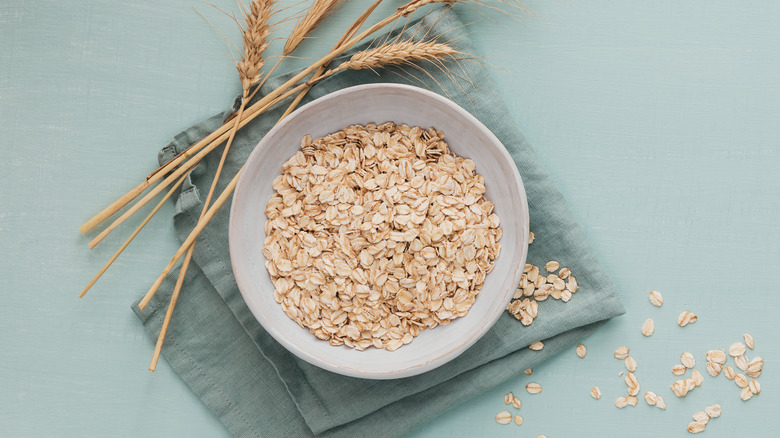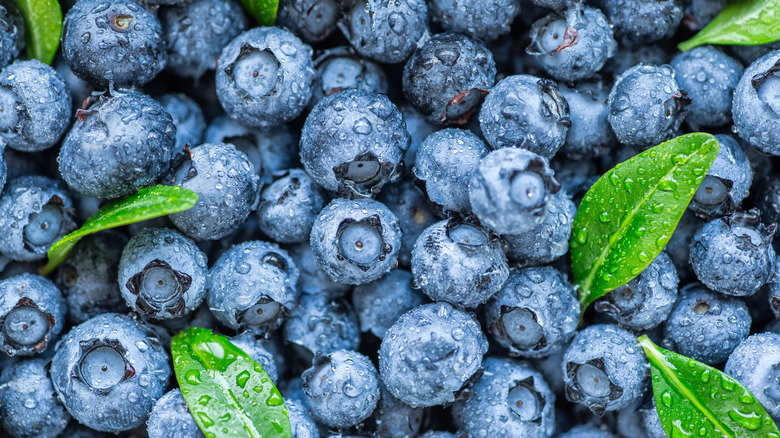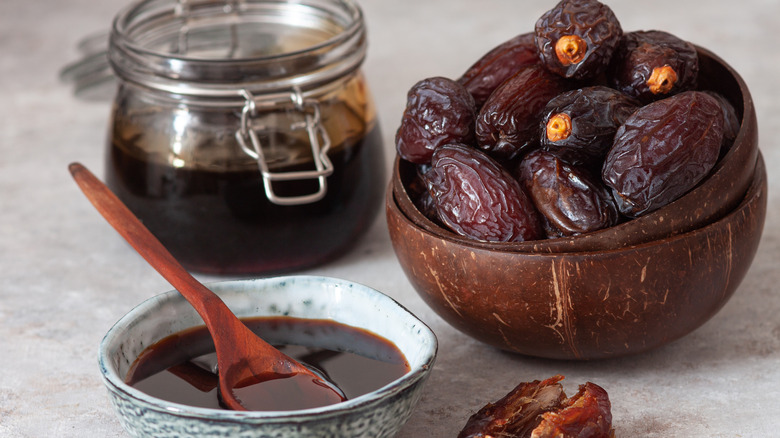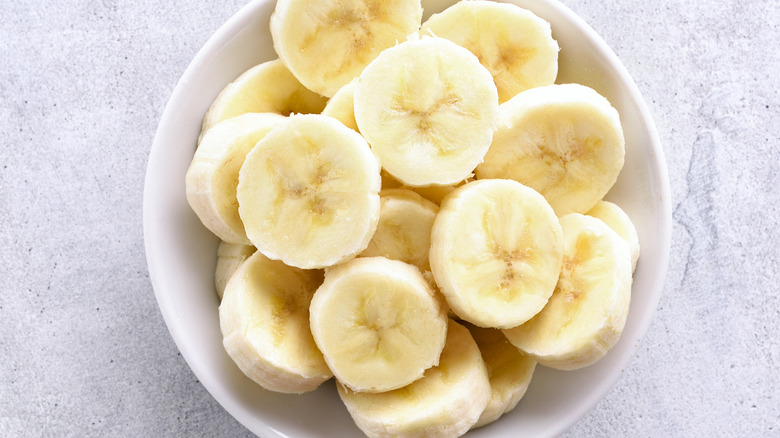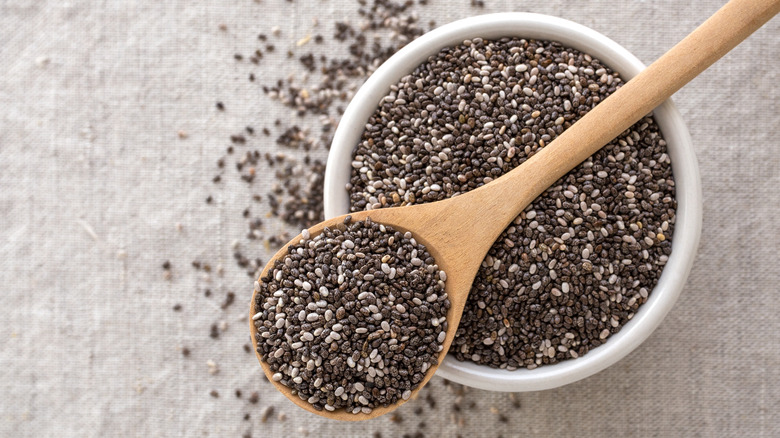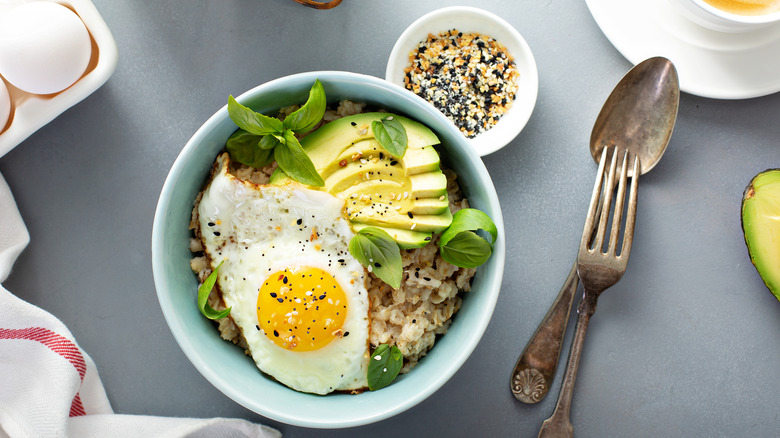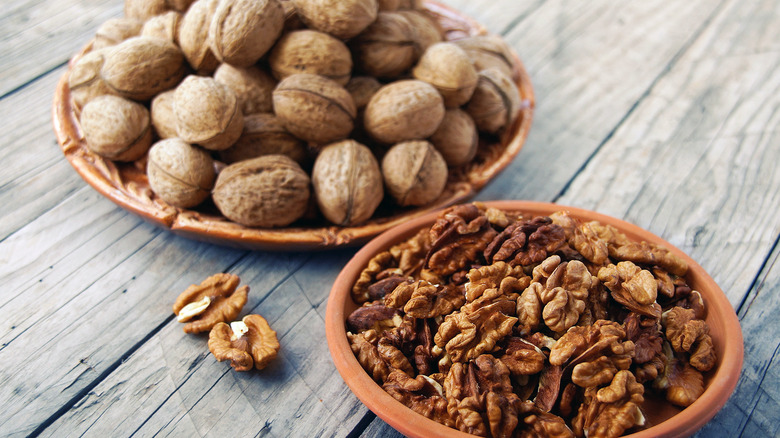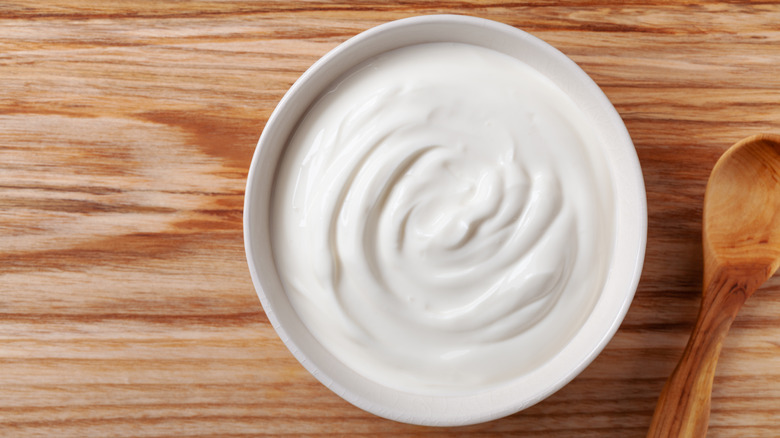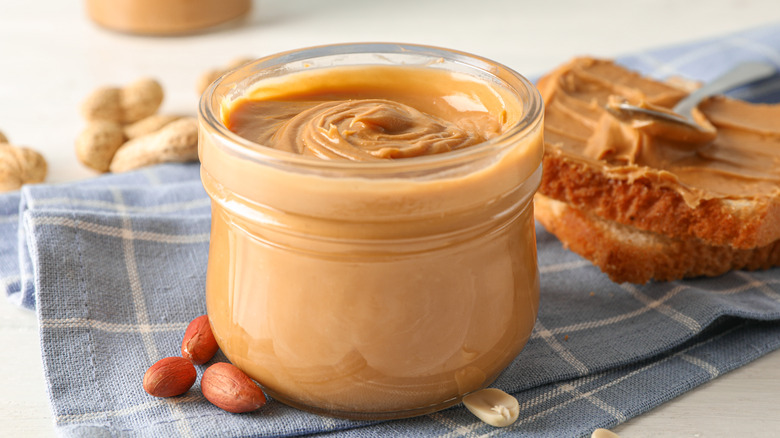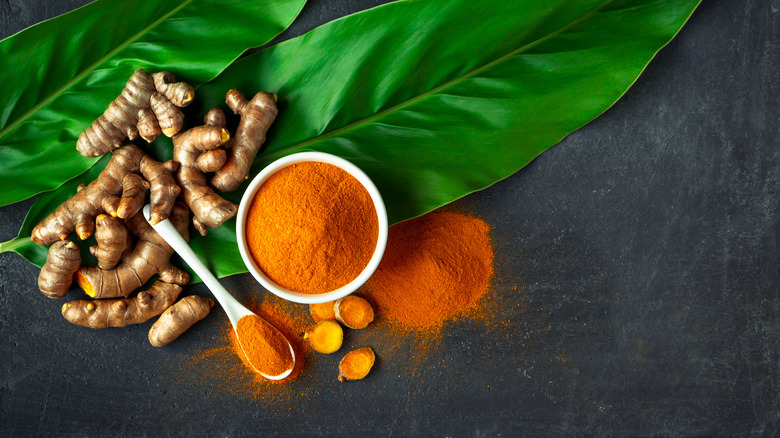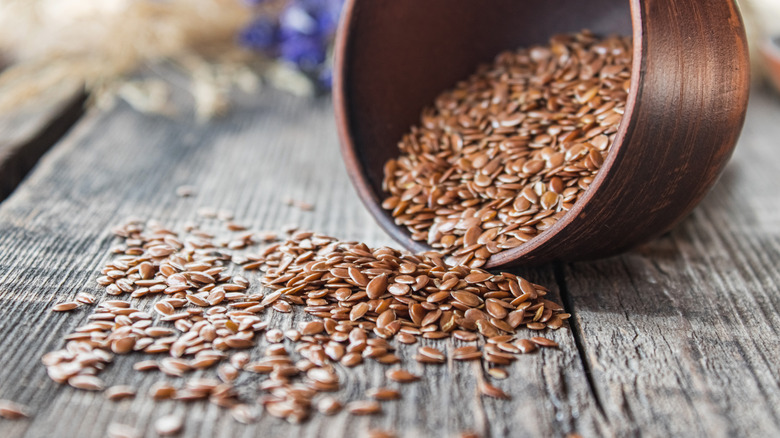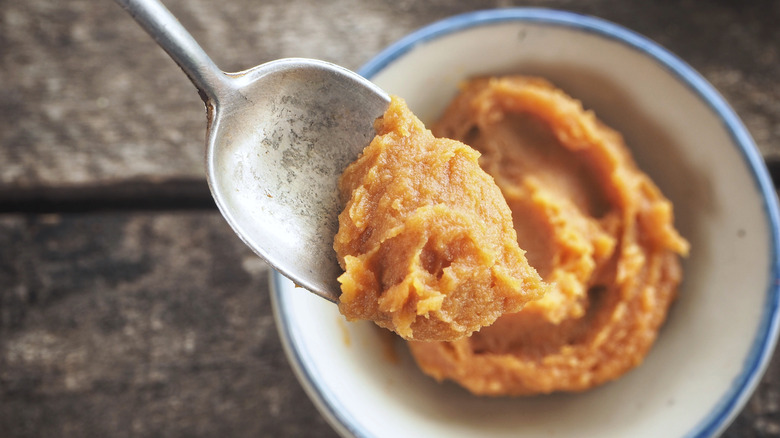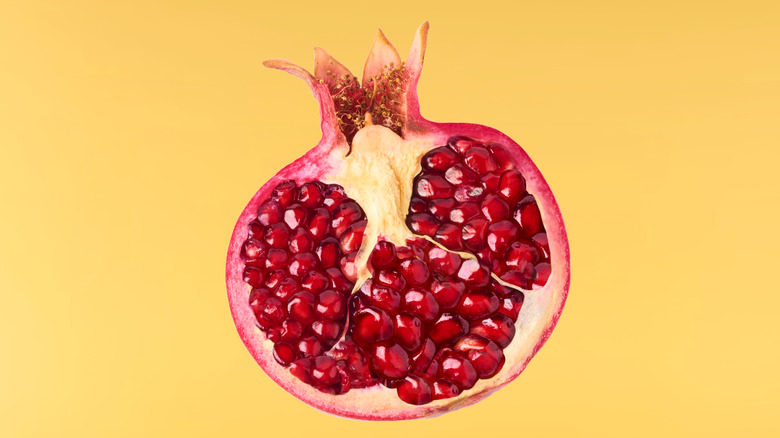Things You Should Be Adding To Your Oatmeal
There's a reason why oatmeal is a staple at breakfast tables around the world. Apart from being a cheap and satisfying meal, a bowl of oatmeal will provide you with a serious dose of daily nutrition. Oatmeal not only delivers a great amount of protein and healthy beta glucan fiber per serving, but it's also antioxidant-rich, can help to lower the risk of heart disease and general mortality, and help with weight control, as registered dietitian Cynthia Sass wrote in an article for Health.
And for topping-lovers, oatmeal is a bowl that thrives on additions. However, the wrong toppings could end up making your morning breakfast less healthy than you'd like: by including high doses of sugars or fats in your oatmeal, for example, you could end up negating the positive benefits of the meal (per Runner's World). Luckily, there are loads of options out there for things to add to your oatmeal that could make it even healthier for you, while still remaining delicious. Let's check out some great additions that could boost your bowl's nutrition through the roof.
Add blueberries for an antioxidant boost
Blueberries are commonly labeled as a superfood. While the jury may still be out on that labeling, per Harvard T.H. Chan School of Public Health, there's no denying their known health benefits, and their delicious taste. Blueberries are high in vitamin C, with just 1 cup of blueberries providing 24% of the adult recommended daily allowance (via Medical News Today). Additionally, as a source of vitamin K, iron, and zinc, among other essential nutrients, blueberries can help to support bone health, among various other benefits.
It's the antioxidants that are present in blueberries, however, that get them their revered status. In addition to the vitamin C present, blueberries are high in polyphenols which, according to nutritionist Jenna Hope, are "potent antioxidants which help to counterbalance free radicals in the body. Blueberries are rich in anthocyanins, a type of polyphenol that has been shown to support heart health" (via Net Doctor). With antioxidants helping to protect our bodies against a variety of diseases, their presence in blueberries could make adding them to oatmeal a wise and healthy choice, as well as a flavorful one.
Date syrup could be a more nutritious way to sweeten your bowl
Let's be real: Oatmeal is good for you, sure, but without a little something added to it, it's just a bit bland. However, date syrup could give you that sweet edge while also providing some nutrients along the way. According to Dr. Tracy Lockwood Beckerman, author of "The Better Period Food Solution" and host of Well+Good's You Versus Food, "date syrup is made from the superfruit dates, so it's naturally rich in stress-relieving magnesium and potassium." (via Well+Good). Magnesium and potassium are also important nutrients for the maintenance of heart health and bone formation, according to Verywell Fit.
However, while date syrup is definitely a more nutritious source of sweetness for a bowl of oatmeal than refined sugar, it's important to remember that it is still naturally occurring sugar in itself, due to its high fructose content. As such, if you're watching your sugar or carbohydrate intake for any reason, it's important to keep this in mind.
Add sliced banana for some great additional fiber
One of oatmeal's best friends is one of the easiest to find in your grocery store. A chopped banana will not only give your oatmeal a sweet edge but could also provide a wide range of health benefits, according to San Diego-based nutritionist Laura Flores, who told Live Science, "Bananas are known to reduce swelling, protect against developing Type 2 diabetes, aid in weight loss, strengthen the nervous system and help with production of white blood cells, all due to the high level of vitamin B6 that bananas contain."
If that isn't good enough, bananas can top up your oatmeal's fiber content pretty significantly, with one medium banana containing around 3.1 grams of fiber (via Healthline). This can help to promote natural stool movement, further aided by the resistant starch present in bananas, which can not only aid with digestion but can also help promote a feeling of fullness for longer after eating. Not bad for a cheap and humble fruit!
Chia seeds add nutritional bang for your buck
They may not be the most obvious addition to a bowl of oatmeal, but chia seeds should not be overlooked. And we're willing to bet you won't regret adding them into the mix. These little seeds are not only packed with fiber and protein — they can provide an extraordinary amount of manganese, calcium, phosphorous, and omega-3 fats per 1-ounce serving (via Healthline).
Aside from their impressiveness on the nutrient front, chia seeds can also be used in oatmeal to totally mix up your breakfast game. Instead of groggily toiling over a stove first thing in the morning only to end up with watery porridge, preparing a batch of overnight oats with chia seeds can provide a thick and glorious breakfast bowl with minimal effort. As Rick Martinez, associate food editor for Bon Appétit pointed out, chia seeds can serve to naturally thicken oatmeal if it's added ahead of time, allowing the seeds to soak and plump up. Give them a go — they might just change how you see oatmeal for good.
Eggs and avocado make your oatmeal a savory delight
Who said that oatmeal had to be sweet? If you're accustomed to having eggs and avocado on toast, subbing out your bread for a healthy grain like oats could put a twist on your breakfast while still keeping you energized.
Adding eggs and avocados could also boost oatmeal's health-supporting properties. As registered dietitian Julia Zumpano told the Cleveland Clinic, "Avocados are a great addition to a healthy diet." They're high in vitamins C, E, and B-6, as well as being an excellent source of monounsaturated fats, which are helpful for reducing the levels of LDL cholesterol, or "bad" cholesterol, and maintaining cellular health. Eggs, on the other hand, can boost the protein of your oatmeal, as well as similarly providing various minerals and nutrients like selenium and phosphorous, and a source of HDL, or "good" cholesterol (via WebMD).
If you're daunted by the idea of savory oatmeal, start with this recipe from Real Simple. It takes a portion of easily prepared oatmeal and tops it with a fried egg, avocado, and some salsa.
Walnuts are an excellent addition
While most nuts will provide a nutritional boost to oatmeal, it's walnuts that really do it for us. Walnuts are not only a great source of antioxidants — with a higher antioxidant content than any other familiar nut — but they also provide a great source of fiber, omega-3 fats, and vitamins and minerals that can help to support your health (per Healthline). These components have been shown to contribute to a range of positive health benefits with regular walnut intake.
A 2020 review of scientific studies published in Nutrients shows the notable and numerous areas that walnuts could help with supporting health, with the review's authors writing that "substantial evidence from animal and human studies suggests that dietary consumption of walnuts (1–2 oz per day) can improve cognitive function and also reduce the risk of other diseases, such as cardiovascular disease, depression, and type 2 diabetes, which are risk factors for the development of dementia." With benefits like that, a daily handful of walnuts in your oatmeal is a no-brainer.
Dark chocolate could make your oatmeal decadent but nutritious
This is one you might love us for. Although high-sugar milk chocolate is probably not the healthiest choice to stir into oatmeal, dark chocolate could provide some fairly notable nutrition, primarily due to its antioxidant content.
According to registered dietitian Toby Amidor, cookbook author and nutrition expert for the Food Network, the antioxidants in dark chocolate are due to the cacao that makes up the food. As she explained to Everyday Health, "Cacao is packed with numerous antioxidants — actually more than green tea or red wine. The darker you go, the more antioxidants you'll get." Amidor, however, did point towards the fact that while dark chocolate can be antioxidant-rich, adding it with prudence is important, saying that "there needs to be a balance between eating palatable dark chocolate and getting the health benefits."
As well as the antioxidants you'll get when eating high-percentage dark chocolate, it's also a great source of various minerals like iron, copper, magnesium, zinc, and phosphorous, according to the Harvard T.H. Chan School of Public Health. To reap the most benefits from dark chocolate, aim for a source that's 70% dark chocolate or above.
Greek yogurt can help preserve your microbiome
If you're a fan of keeping things simple, adding Greek yogurt to your oatmeal could be a quick and easy way to enhance your breakfast. In addition to the unmistakable tang that yogurt adds, Greek yogurt can also deliver some pretty great health benefits, according to Britany Modell, registered dietitian and founder of Brittany Modell Nutrition and Wellness. As she told Well+Good, "Greek yogurt is a creamy, thick yogurt, which has been strained to remove the liquid whey protein. It is packed with probiotics, which enhance the microbiome and is a rich source of calcium and B12."
As your microbiome, an essential collection of microorganisms primarily found in the stomach, serves to invigorate the immune system and help with food synthesis and processing, keeping it healthy and well-tended is vital (via Harvard T.H. Chan School of Public Health). Vitamin B12, too, is an essential vitamin that can be instrumental for the protection of mental health during the aging process, as well as potentially helping protect heart health, per the National Institutes of Health Office of Dietary Supplements).
Peanut butter is a great oatmeal topper, but choose your brand carefully
Peanut butter pairs well with oatmeal. And don't let its high-fat content put you off, as it can be both a flavorful and healthy addition to your breakfast. As Laura Iu, a registered dietitian and nutrition therapist based in New York City, told Health, "Peanuts are a great source of protein, fat, niacin, magnesium, vitamin E, biotin and copper."
Iu also revealed that the fats in peanut butter can actually help you stay full. She explained, "Sometimes peanut butter gets a bad [reputation] because of its fat content, but fat is an essential component to feeling satisfaction. This means that having pretzels or fruit with peanut butter can help you feel fuller longer than if you were to just eat the pretzels or fruit by itself."
Although peanut butter could be a great choice to add to oatmeal, certain brands can come loaded with sugar, hydrogenated oils, and palm oil, per Food & Nutrition. As such, Keri Gans, a registered dietitian nutritionist in New York City, advised "[looking] for brands that have no more than peanuts and salt, plain and simple" (via Health).
Turmeric can add color as well as nutrition
It may sound like we pulled this ingredient out of left field, but adding turmeric to a bowl of oatmeal is a quick way to get some great benefits — as well as some pretty beautiful color (just keep it away from your clothes).
According to registered dietitian nutritionist Krista King of Composed Nutrition, "Turmeric is a spice with a vibrant yellow color due to the active compound curcumin, which is responsible for its anti-inflammatory benefits" (via Well+Good). As Healthline pointed out, not only is curcumin a natural anti-inflammatory compound, which helps to maintain good health and help fight against heart disease, but it can also help to hugely increase your body's antioxidant capacity.
King recommends adding black pepper along with turmeric to any food (including oatmeal), as the pepper can help with the absorption of curcumin through the presence of piperine, which helps the body use it more effectively. If using turmeric in your oatmeal sounds a little intimidating, Bon Appétit's got your back. This overnight oats recipe is packed with seeds, nuts, and the all-important spice.
Flaxseed provides big nutrition in a small package
You might be surprised at how nutritious the humble flaxseed is. Well, sometimes big things come in little packages, and when it comes to how good for you a serving of flaxseeds can be, this is certainly the case. Not only a great source of protein and soluble fiber, flaxseed also contains a large amount of omega-3 fatty acids, vital for the protection of heart health, with flaxseeds coming in as the richest source of alpha-linoleic acid (or ALA) among plant foods (via Cleveland Clinic). Flaxseeds are also incredibly rich in lignans, a type of chemical compound that not only has antioxidant properties but can help fight against breast cancer, osteoporosis, and heart disease.
If you're new to flaxseeds, however, make sure to start slow. Flaxseeds, as with any food high in fiber, can cause bloating or discomfort if pivoting from little fiber to a suddenly much larger amount. Julia Zumpano, registered dietitian, told the Cleveland Clinic, "I suggest starting with a teaspoon a day and working your way up to 2 tablespoons." With that amount, you might not even notice it in your oatmeal — but you may well notice the benefits.
Maple syrup delivers essential minerals as well as sweetness
It's not just for your pancakes. If you like your oatmeal on the sweeter side, a squeeze of maple syrup could be just the ticket, particularly considering that by and large, it's a more nutritious alternative to refined sugar. While maple syrup is largely composed of sucrose (the same compound as regular sugar), its antioxidant and mineral content set it apart (via Healthline). A serving of pure maple syrup contains notable amounts of zinc and manganese, as well as containing amounts of iron, potassium, and calcium.
On the antioxidant front, it also fares well. According to a study published in the Journal of the American Dietetic Association, it was found that replacing sugar with maple syrup in the diet as a sweetener led to a higher antioxidant intake, similar to the amount present in a serving of berries or nuts. A darker syrup, categorized as Grade B syrup, will generally deliver more antioxidants and minerals. But it's important to remember that despite the healthier aspects of the syrup, it is still high in sugar, and the minerals and antioxidants present don't necessarily offset this fact.
Miso paste packs protein and vitamins
The distinctive flavors of miso might not be your first port of call for a bowl of oatmeal. Nevertheless, once you try it you might just keep coming back for more. The fermented soybean paste is not only high in essential minerals, but it is also beneficial for our microbiome due to its fermented nature, according to an article written by nutritionist Jo Lewin for BBC Good Food. Plus, miso is a source of protein, vitamins E and K, and various B vitamins, including folic acid.
If you're only accustomed to using miso in specific dishes like a classic miso soup, we can understand your trepidation over putting in oatmeal. However, Kitchn's recipe for a simple yet delicious savory oatmeal comprised of miso paste, chicken or vegetable broth, fried eggs, chopped scallions, and, of course, oats is well worth trying. We think we know what we're having for breakfast tomorrow morning...
Pomegranate seeds can brighten your bowl
Ruby-red and bursting with juice, pomegranate seeds could jazz up your bowl of oatmeal in more ways than just visually and flavor-wise. According to nutritionist and registered dietitian Amy Shapiro of Real Nutrition, pomegranate seeds deliver a substantial health kick."One cup of pomegranate arils contains about 7 grams of fiber and 3 grams of protein. Additionally, one cup offers 30 percent of the recommended dietary intake (RDI) for vitamin C and over 35 percent of the RDI for vitamin K," she told Well+Good. "Pomegranates also contain folate and potassium, which can both help maintain healthy blood pressure." And that's not all.
Pomegranate seeds boast a notably high antioxidant compound due to punicalagin, a phenol found in the juice and peel of the pomegranate that can not only have powerful anti-inflammatory properties but can help to keep blood vessels healthy. As Dr. Kate Denniston, licensed naturopathic doctor and founder of Los Angeles Integrative Health, told Well+Good, "Pomegranate seeds also support the synthesis and activity of nitric oxide, which is a substance that helps protect the blood vessel lining against atherosclerosis or 'plaque' and inhibits proliferation of vascular smooth muscle cells or stiffening of arteries."

